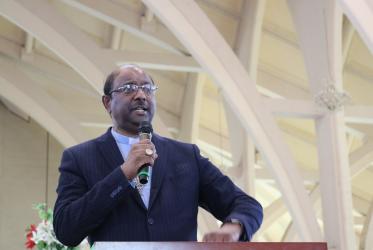delivered by WCC programme executive for human rights Christina Papazoglou
to the 13-17 April 2010 workshop on Human Rights in the Democratic Republic of Congo
Your Beatitudes, your Eminences and Excellencies,
Ministers in the service of Christ,
Greetings to you in the precious name of Jesus Christ!
The Congolese people have been suffering for much too long from a series of human rights violations. Armed conflicts, mainly in the eastern provinces but also widespread violence in other parts of the country due to underlying economic root causes, especially illegal exploitation of natural resources and unresolved land conflicts, have affected the enjoyment of some of the most basic fundamental rights and freedoms. Despite the significant efforts made by the Government to improve the promotion and protection of human rights, the situation today unfortunately remains serious and calls for the concerted efforts of national, regional and international stakeholders, for the advancement and enforcement of protection mechanisms.
Over the years, the World Council of Churches, according to our call to be one in faith and life, has accompanied the people and the churches in Congo, through a number of actions, in their pursuit for peace and respect for human rights, especially those of the most vulnerable, like children, women and internally displaced people. In July 2009, an international team of church representatives traveling as "Living Letters" on behalf of the World Council of Churches and the All Africa Conference of Churches paid a solidarity visit to churches, ecumenical organizations and civil society in Goma and Bukavu in the east, Bas-Congo in the west and the central Kasai province, as well as the area around Kinshasa.
Furthermore, the Central Committee of the World Council of Churches, adopted a statement on sexual violence against women in the DRC, in September 2009, where it urged all parties to the armed conflict to commit themselves immediately to putting an end to all acts of sexual violence against women and girls in the DRC, by ending impunity for rape and by evolving effective strategies to combat this kind of violence. The statement further called on its member churches "to publicly condemn violence against women" and make constructive efforts to overcome such violence by declaring that such violence is a sin. It also encouraged its member churches "to continue offering solidarity to the women of the DRC so that they know that they are not alone in their struggles". This accompaniment includes public campaigns in the framework of the WCC programme "Decade to Overcome Violence (2001-2010)". I have personally talked to several people involved in the churches response to the violence, and know from them how seriously women have been assaulted.
The work of the churches in the DRC to alleviate the humanitarian crisis, promote a peaceful resolution to the conflict and advocate for an end to the violations of human rights, is admirable. The churches are providing a powerful witness. They are the biggest providers of health and education services in the DRC. The churches in Congo are also among the strongest advocates for the promotion and protection of human rights in the DRC.
The WCC has been accompanying them in this effort through its human rights programme, which aims at raising the voice of the victims of human rights abuses to the UN Human Rights Council and to other UN mechanisms. It is within this context that this Workshop is taking place today, hoping to provide a space where churches, civil society and representatives of the government and of the international community can debate on the major human rights challenges that DRC is facing at the moment and on how the churches can further assist the on going efforts for the defense and respect of the fundamental rights and freedoms of the Congolese people. We will carry the cross together, working faithfully together for a better future.
I wish you God’s richest blessings upon each of you who participate in this Consultation!
Yours in Christ's love,
Rev. Dr Olav Fykse Tveit
WCC general secretary





